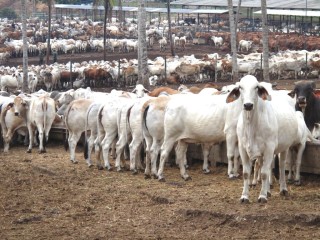 The Federal Government’s suspension of live cattle exports to Indonesia may have been lifted on July 7, but in practical terms the ban remains in full force three weeks later.
The Federal Government’s suspension of live cattle exports to Indonesia may have been lifted on July 7, but in practical terms the ban remains in full force three weeks later.
One month of the three-month-window to meet Indonesia’s new 180,000 head quota for the current quarter has now passed and the Federal Government is still yet to issue a new export permit under its revised export arrangements.
Elders, which owns its own feedlot and abattoir in Indonesia, lodged a noticed of intention to export in mid-July, but as of last night was still waiting for the Federal Government to provide the necessary export permit.
The company has 3000 cattle ready to load in Darwin and the Sahiwal Express booked to ship them, but has now moved its anticipated shipping date back to Saturday, August 6, as a result of the delays.
“We hope to hear something soon,” an Elders spokesman told Beef Central yesterday. “We have to be getting close to gaining formal approval.”
Asked yesterday if minister Joe Ludwig was close to approving export permits, his office was non-committal.
“There a number of exporters that are close to meeting the strict new conditions required for exporting live cattle to Indonesia,” a statement said.
“These new conditions require exporters to have full tracking and tracing of consignments from Australian paddock through to and including the point of slaughter in Indonesia. It also requires independent auditing of the entire supply chain, providing transparency and accountability across the live animal trade.”
As exporters wait for the Federal Government to approve export permits, the financial pressure is building on northern cattle stations desperate to generate cash flow and reduce stocking pressure on paddocks.
While a 180,000 head quota is in place, MLA chairman Don Heatley told ABC radio earlier this week that he did not expect more than 50,000 cattle to go to Indonesia this year because of the new trade conditions.
Competition for space on the remaining vessels is likely to be intense, and there is a fear among smaller family owned operations that they will miss out.
Commercial realities suggest that larger corporate players with long-standing supply arrangements and the critical mass to fill large orders are likely to dominate remaining orders to Indonesia this year.
AA Co has 11,000 cattle that were forward-sold prior to the ban awaiting shipment while Consolidated Pastoral Company, which has part-ownership of a feedlot in Indonesia, has indicated it hopes to ship 15,000 cattle before Christmas.
Those two companies, alone, could account for more than half of the forecast 50,000 head trade between now and year’s end.
Northern Territory Cattleman’s Association deputy chair, Top End, Chris Muldoon said family owned and operated station businesses accounted for 90pc of northern live export supply, while corporate-sized enterprises supplied the balance.
“Essentially the family owned and operated businesses underpin the industry, but having said that the corporates have got the critical mass and can fill shipments on their own and in their own right,” he said.
“That could potentially make it difficult for the smaller operators to get their six or 12 or 18 decks on those shipments, if the bigger players are filling those orders.”
Much now hangs on how quickly exporters can get supply chains up and running in Indonesia and boats on the water over the next two months.
The NT Cattleman’s Association and AA Co have called for the establishment of a Northern Territory Cattle Marketing Pool with seasonal loan guarantees from the Federal and NT Governments to alleviate cash flow pressure on all affected producers.
Under the proposal producers would commit to sell cattle into the pool and receive 50 percent of the Port value of the stock, with the remainder of the value to be received progressively as cattle from the pool are sold, less any associated management costs.
It will provide Australian producers the ability to monetise cattle destined for live export and partially mitigate cash-flow disruptions which have occurred as a result of the ban.
“It definitely would give producers who are struggling for cash flow an injection to be able to service some of their debts, Mr Muldoon said.
“The Federal Government is definitely keen for industry to provide them with options to help alleviate some of the pain, and the pool is one of those options.”
The Federal Government has not yet indicated whether it will support the pool proposal.
“The Government is aware of the proposal and is seeking advice on the concept,” a spokesman for Mr Ludwig said yesterday.



HAVE YOUR SAY